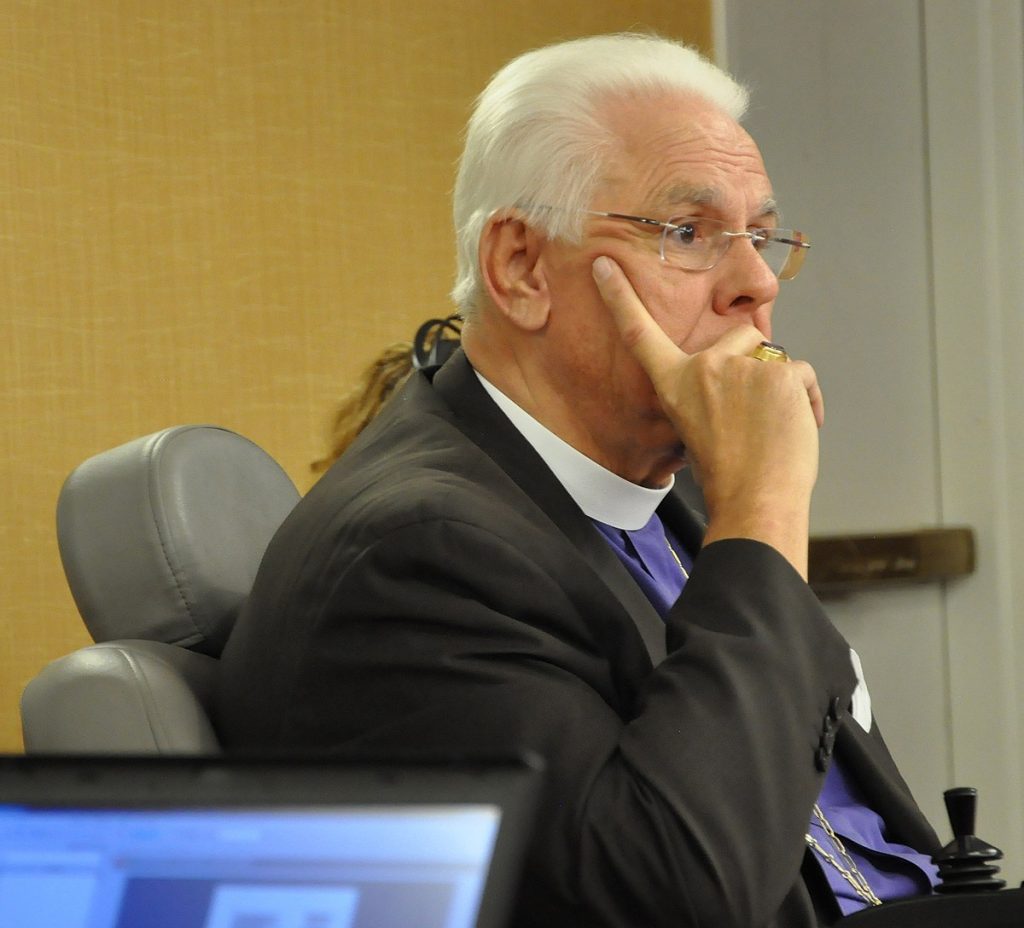A Draft decision from the Hearing Panel reviewing complaints of Bishop J. Jon Bruno of Los Angeles handling of the sale of church property in Newport Beach suggests that Bishop Bruno will have his ministry suspended for three years, but stops short of deposition.
A) Bishop Bruno is suspended for three years. During the period of his suspension Bishop Bruno will refrain from the exercise of the gifts of the ministry conferred by ordination (Canon IV.2, definition of “Sentence”) and not exercise any authority over the real or personal property or temporal affairs of the Church (Canon IV.19.7)
B) The Hearing panel declines to depose Bishop Bruno
C) The Hearing Panel is not aware of any evidence supporting a need for forensic accounting. IF the Church Attorney possesses such evidence he should present it to the appropriate authorities.
D) After thorough and detailed consideration of the facts, positions, contentions, testimony and documents, the Hearing Panel has concluded that the scope and severity of Bishop Bruno’s misconduct, as described above, have unjustly and unnecessarily disturbed the ministry of the Church. St James the Great is a casualty of Bishop Bruno’s misconduct acting as Diocesan and Corp Sole. While it is beyond the authority and ability of the Hearing Panel to fully assess what might have happened if St James the Great had been allowed to continue its ministry in its church facility, there is ample evidence of its viability and promise to convince the Hearing Panel that St James the Great was robbed of a reasonable chance to succeed as a sustainable community of faith.
The panel essentially affirmed that Diocesan bishops do hold authority over property but also affirmed that the Standing Committee has a crucial role in all issues of property.
“While Canon IV.14.6 would allow the Hearing Panel to take action for the benefit of St James the Great, the Hearing Panel has concluded that Title IV disciplinary actions are not designed to address the complexities of the specific diocesan property issues that are before it. The Hearing Panel believes that bishops do and should have authority over mission property and that Standing Committee review and approval is a crucial part of the fabric and polity of the church. But more importantly, the Hearing Panel is convinced that the Diocese of Los Angeles, particularly its Standing Committee with the supportive leadership of its newly ordained Coadjutor, must consciously choose to take part in a process of self-examination and truth-telling around these unfortunate and tragic events.”
Though the panel, however, stopped short of directing the diocese to restore St James the Great congregation to the disputed property. Believing that true reconciliation could not be achieved that way. It did strongly recommend that it do so.
“The Hearing Panel strongly recommends to the Diocese of Los Angeles that as a matter of justice it immediately suspend its efforts to sell the St James property, that it restore the congregation and vicar to the church building and that it reassign St James the Great appropriate mission status” [bolded in original].
Though unsigned, the Draft has the names of four members of the panel; The Rt Rev Herman Hollerith, IV, The Rt Rev Nicholas Knisely, The Rev Erik Larsen, and Ms. Deborah Stokes.
Bishop Smith of North Dakota, the fifth member of the panel has offered a dissent. In that dissent, while recognizing the shortcomings of using a Corp Sole, the Standing Committee’s neglect of its canonical duties, and Bishop Bruno’s mixed signals to the congregation; Smith holds to the belief that Bruno acted wholly within his rights as Bishop Diocesan and that adjudication of property disputes belongs solely within the authority of the diocese.
“It is my understanding that in the Episcopal Church, resolution of property disputes properly resides within local diocesan entities, notably the Bishop and Standing Committee, and should not be adjudicated through the disciplinary process.”
One of his most significant complaints is that both Bishop Bruno and Save St James the Great resorted to the secular courts in this dispute. Suggesting even that the effort to reclaim the property from the breakaway group in the first place was inappropriate. After quoting 1Corinthians 6:1, 7-8; he writes;
“Both parties have ignored this scriptural wisdom: the Bishop, when he resorted to the secular court against the
Anglicans who attempted to depart with the property; and the congregation of St. James the Great, under the guise of “Save St. James the Great,” when it filed a civil complaint against the Bishop to stop the sale of the property. Christian reconciliation becomes an elusive goal under these circumstances.”
It should be noted that Bishop Smith is a member of the Communion Partners, which has largely sought to put forth the minority opinion that the church is a confederation of otherwise independent dioceses rather than a single unity organized into separate diocesan jurisdictions.
Our comment policy requires that you use your real name. Comments that use non-PG rated language, include personal attacks, that are not provable as true or that we deem in any way to be counter to our mission of fostering respectful dialogue will not be posted

